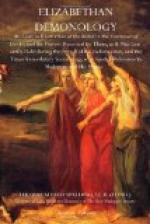11. I intend, therefore, to attempt to sketch out the leading features of a phase of religious belief that acquired peculiar distinctness and prominence during Shakspere’s lifetime—more, perhaps, than it ever did before, or has done since—the belief in the existence of evil spirits, and their influence upon and dealings with mankind. The subject will be treated in three sections. The first will contain a short statement of the laws that seem to be of universal operation in the creation and maintenance of the belief in a multitudinous band of spirits, good and evil; and of a few of the conditions of the Elizabethan epoch that may have had a formative and modifying influence upon that belief. The second will be devoted to an outline of the chief features of that belief, as it existed at the time in question—the organization, appearance, and various functions and powers of the evil spirits, with special reference to Shakspere’s plays. The third and concluding section, will embody an attempt to trace the growth of Shakspere’s thought upon religious matters through the medium of his allusions to this subject.
* * * * *
12. The empire of the supernatural must obviously be most extended where civilization is the least advanced. An educated man has to make a conscious, and sometimes severe, effort to refrain from pronouncing a dogmatic opinion as to the cause of a given result when sufficient evidence to warrant a definite conclusion is wanting; to the savage, the notion of any necessity for, or advantage to be derived from, such self-restraint never once occurs. Neither the lightning that strikes his hut, the blight that withers his crops, the disease that destroys the life of those he loves; nor, on the other hand, the beneficent sunshine or life-giving rain, is by him traceable to any known physical cause. They are the results of influences utterly beyond his understanding—supernatural,—matters upon which imagination is allowed free scope to run riot, and from which spring up a legion of myths, or attempts to represent in some manner these incomprehensible processes, grotesque or poetic, according to the character of the people with which they originate, which, if their growth be not disturbed by extraneous influences, eventually develop into the national creed. The most ordinary events of the savage’s every-day life do not admit of a natural solution; his whole existence is bound in, from birth to death, by a network of miracles, and regulated, in its smallest details, by unseen powers of whom he knows little or nothing.
13. Hence it is that, in primitive societies, the functions of legislator, judge, priest, and medicine man are all combined in one individual, the great medium of communication between man and the unknown, whose person is pre-eminently sacred. The laws that are to guide the community come in some mysterious manner through him from the higher powers. If two members of the clan are involved in a quarrel,




